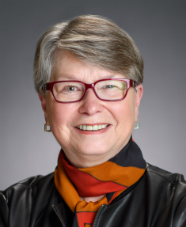From the Executive Director: Give Peace a Chance
 When she was twelve, I took my oldest granddaughter to Washington, D.C., to see the Fourth of July fireworks. The next day, we were sitting on a bench in Arlington National Cemetery looking out over acres of white crosses that marked the graves of American lives lost in combat. As we talked about how many wars were represented there, Dana’s comment stopped the conversation: “There’s been war my whole life.” She was right, of course, there had been. Still is. Her haunting words brought to mind a poster from the Vietnam era: “War is not healthy for children or other living things.”
When she was twelve, I took my oldest granddaughter to Washington, D.C., to see the Fourth of July fireworks. The next day, we were sitting on a bench in Arlington National Cemetery looking out over acres of white crosses that marked the graves of American lives lost in combat. As we talked about how many wars were represented there, Dana’s comment stopped the conversation: “There’s been war my whole life.” She was right, of course, there had been. Still is. Her haunting words brought to mind a poster from the Vietnam era: “War is not healthy for children or other living things.”
Conflict has been a feature of the human experience from its beginnings. In the fourth century BCE Herodotus, a Greek writer considered to be the father of history as we know it, recounted the Greco-Persian wars in “The Histories.” Ancient texts that predate his, many of those religious, are replete with what seems incessant conflict among humans. This acknowledgement, however, is incomplete without a parallel account of efforts at reconciliation and reduction of conflict.
One of the most intriguing developments of the early twentieth century was an international peace movement that began during World War I, which came to be known as “the war to end all wars.” The movement culminated in a multinational conference in Paris in 1928 where fifteen nations signed the Kellogg-Briand Pact, a treaty that outlawed war as a means of resolving “disputes or conflicts of whatever nature or whatever origin” between states. The treaty was easily the most idealistic ever signed, and many historians agree the most foolish, as it would be only a decade before the world was again engulfed in war.
But the principle behind the pact, that conflict need not be inevitable between those who disagree, speaks to an optimism in the human spirit, a sense of possibility that there is a higher road to be taken.
Conflict is a red thread drawn through the history of the church body I study, as is true of most religious groups, indeed, most communities, most organizations, and the history of almost every nation. Look sometime at the section in your local bookstore marked war, which is often larger than the entire section on history. You won’t find an equivalent section on peace.
Daily news across the globe is consumed with stories of tensions and discord on a scale from global to interpersonal as well as looming threats of conflict should a disagreement escalate. But if, as sociologist Lewis Coser writes in his classic, The Functions of Social Conflict, “a certain degree of conflict is an essential element in group function and the persistence of group life,” might we learn to become less conflict avoidant even as we search for resolution?
After all, the heart of democracy is rooted in healthy debate among citizens holding strong differences of opinion, all while seeking the common good.